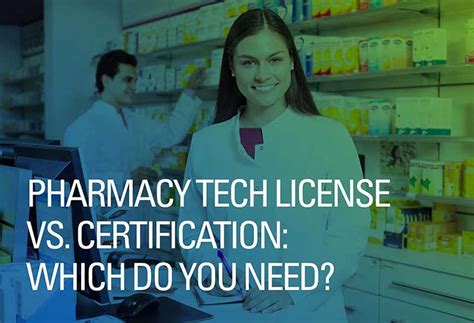As a pharmacy technician, it's essential to understand the difference between licensure and certification. While both terms are often used interchangeably, they have distinct meanings and implications for your career. In this article, we'll delve into the 5 key differences between licensure and certification for pharmacy technicians, helping you navigate the requirements and benefits of each.
Pharmacy technicians play a vital role in the healthcare system, working under the supervision of licensed pharmacists to dispense medications, manage inventory, and assist patients. As the demand for pharmacy technicians continues to grow, it's crucial to understand the regulations and certifications that govern this profession.
Licensure and certification are two separate processes that serve different purposes. Licensure is a mandatory requirement that varies by state, while certification is a voluntary process that demonstrates expertise and commitment to the profession. Understanding the differences between licensure and certification will help you make informed decisions about your career and ensure you're meeting the necessary requirements to practice as a pharmacy technician.
1. Definition and Purpose
Licensure is a state-specific requirement that allows individuals to practice as pharmacy technicians within a particular state. The primary purpose of licensure is to protect the public by ensuring that pharmacy technicians meet minimum standards of education, training, and competence. Licensure is typically governed by state boards of pharmacy, which set the requirements and regulations for pharmacy technicians.
Certification, on the other hand, is a voluntary process that demonstrates a pharmacy technician's expertise and commitment to the profession. Certification is offered by professional organizations, such as the Pharmacy Technician Certification Board (PTCB) or the National Healthcareer Association (NHA), and is recognized nationally. The primary purpose of certification is to validate a pharmacy technician's knowledge, skills, and experience, and to provide a competitive edge in the job market.

2. Requirements and Eligibility
Licensure requirements vary by state, but typically include:
- Completion of a pharmacy technician training program approved by the state board of pharmacy
- Passing a state-specific licensure exam
- Background check and fingerprinting
- Payment of licensure fees
Certification requirements, on the other hand, are standardized and include:
- Completion of a pharmacy technician training program approved by the certifying organization
- Passing a certification exam, such as the Pharmacy Technician Certification Exam (PTCE) or the Certified Clinical Pharmacy Technician (CCPhT) exam
- Meeting continuing education requirements to maintain certification
Eligibility Requirements for Certification
To be eligible for certification, pharmacy technicians must meet the following requirements:
- Be at least 18 years old
- Have a high school diploma or equivalent
- Complete a pharmacy technician training program approved by the certifying organization
- Pass a certification exam

3. Scope of Practice
Licensure dictates the scope of practice for pharmacy technicians within a particular state. The scope of practice varies by state, but typically includes:
- Dispensing medications under the supervision of a licensed pharmacist
- Managing inventory and supplies
- Assisting patients with medication-related queries
- Performing administrative tasks
Certification, on the other hand, demonstrates a pharmacy technician's expertise and competence in specific areas, such as:
- Sterile compounding
- Clinical pharmacy services
- Pharmacy informatics
Scope of Practice for Certified Pharmacy Technicians
Certified pharmacy technicians may be authorized to perform advanced tasks, such as:
- Conducting medication therapy management (MTM) services
- Providing patient education and counseling
- Participating in clinical trials and research studies

4. Benefits and Advantages
Licensure provides several benefits, including:
- Protection of the public by ensuring that pharmacy technicians meet minimum standards of education, training, and competence
- Increased accountability and transparency in the profession
- Enhanced credibility and reputation for licensed pharmacy technicians
Certification offers several advantages, including:
- Demonstrated expertise and commitment to the profession
- Competitive edge in the job market
- Opportunities for career advancement and professional growth
Benefits of Certification for Pharmacy Technicians
Certification can provide pharmacy technicians with:
- Increased job satisfaction and engagement
- Improved patient care and outcomes
- Enhanced collaboration and communication with healthcare professionals

5. Renewal and Maintenance
Licensure renewal requirements vary by state, but typically include:
- Completing continuing education requirements
- Paying licensure fees
- Meeting other state-specific requirements
Certification renewal requirements are standardized and include:
- Completing continuing education requirements
- Passing a certification exam or assessment
- Meeting other certification-specific requirements
Renewal Requirements for Certified Pharmacy Technicians
Certified pharmacy technicians must meet the following renewal requirements:
- Complete 20 hours of continuing education every 2 years
- Pass a certification exam or assessment every 2 years
- Meet other certification-specific requirements

In conclusion, licensure and certification are two separate processes that serve different purposes for pharmacy technicians. Licensure is a mandatory requirement that varies by state, while certification is a voluntary process that demonstrates expertise and commitment to the profession. Understanding the differences between licensure and certification will help you navigate the requirements and benefits of each, ensuring you're meeting the necessary requirements to practice as a pharmacy technician.






FAQ Section:
What is the difference between licensure and certification for pharmacy technicians?
+Licensure is a mandatory requirement that varies by state, while certification is a voluntary process that demonstrates expertise and commitment to the profession.
What are the requirements for licensure as a pharmacy technician?
+Licensure requirements vary by state, but typically include completing a pharmacy technician training program, passing a state-specific licensure exam, and meeting other state-specific requirements.
What are the benefits of certification for pharmacy technicians?
+Certification provides several benefits, including demonstrated expertise and commitment to the profession, competitive edge in the job market, and opportunities for career advancement and professional growth.
